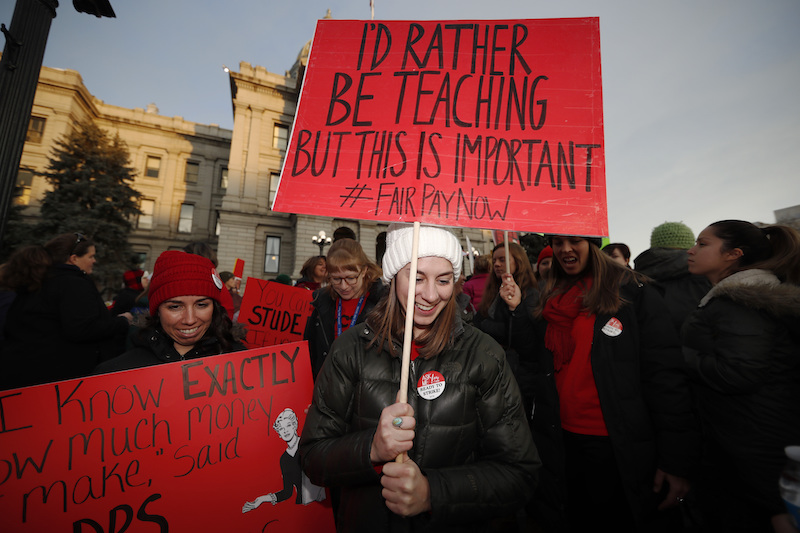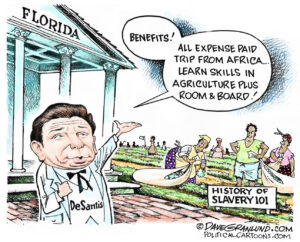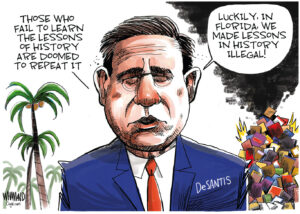Denver Teachers to Strike as Educators Continue to Lead Labor Movement
The union said the strike will begin Monday after it failed to negotiate with the school district over issues including teacher pay. Margaret Flynn, center, a seventh-grade teacher in Denver, leads other teachers during a rally outside the state Capitol. (David Zalubowski / AP)
Margaret Flynn, center, a seventh-grade teacher in Denver, leads other teachers during a rally outside the state Capitol. (David Zalubowski / AP)
Teachers in Denver are preparing to strike Monday over wages and working conditions after failing to reach agreement after 14 months of negotiations with the school district.
The planned strike could help cement teachers’ leading role in the labor movement, following a recent victory for Los Angeles educators, who reached a deal on a variety of issues after a weeklong strike in January. Teachers in the California cities of Oakland and Sacramento may be preparing to walk off the job next.
Last year, the number of workers who went on strike was the highest in 32 years. The vast majority—more than 90 percent—were members of education, health care and social assistance groups. The 20 biggest work stoppages in 2018 involved 485,000 workers, according to data released Friday by the Bureau of Labor Statistics (BLS).
Denver teachers union lead negotiator Rob Gould expressed frustration Saturday over the solutions offered by Denver Public Schools Superintendent Susana Cordova: “I think we’re at this point where you keep asking teachers to compromise over and over. What else do you want from us, Susana? We give you our lives. What are you willing to give us?”
When Cordova responded that she wanted to continue negotiations, Gould announced that the union would return to the bargaining table Tuesday, after the strike. Points of contention include the complicated system the school district uses to calculate bonuses and the its disproportionate number of highly paid administrative positions compared with teaching positions.
“We will strike Monday for our students and for our profession,” said teachers union President Henry Roman, “and perhaps then [the school district] will get the message and return to the bargaining table with a serious proposal aimed at solving the teacher turnover crisis in Denver.”
.@DenverTeachers yell “123 Solidarity!” Time to head to prepare for tomorrow to fight for the #SchoolsOurStudentsDeserve and fair pay. #StrikeReady #Solidarity #RedForEd #DCTAstrong #copols #Education pic.twitter.com/wzeOqId863
— Colorado Education Association (@ColoradoEA) February 10, 2019
“I didn’t expect to make a lot of money,” said Denver teacher Amber Wilson, “but I didn’t expect in my late 30s and early 40s to be waiting with bated breath for my paycheck to come at the end of the month.”
The largest strike of 2018 was in Arizona and involved 81,000 teachers who collectively accounted for 486,000 lost days of work, according to the BLS. The walkout ended after the governor agreed to give teachers a 19 percent pay raise. The next biggest strike, which resulted in 405,000 working days lost, was in Oklahoma, where teachers went on strike over class size and pay.
Some of the biggest work stoppages last year were called for by union members, not their leadership, according to Patrick Martin at the World Socialist Web Site.
“Of the six conflicts in 2018 with the largest impact in terms of work days lost, only one, against the Marriott hotel chain, was called by the unions. Four were statewide teachers’ strikes initiated by the rank-and-file on their own, using social media,” Martin wrote.
Los Angeles teachers union President Alex Caputo-Pearl said he attributes its victory last month to “old-fashioned organizing.”
We’ve spent the last few years building systems and structures among our members, parents, and community organizations. By the time we went on strike, we had all nine hundred schools ready to go with contract action teams at just about every single school. We had regional structures that parents and community were involved in. Then once we went on strike, the issues touched a nerve publicly, and tens of thousands of more parents and community got involved.
In Oakland, the union has authorized a strike over teacher pay, class size and school privatization. In Sacramento, a judge ordered the school district to return to arbitration Wednesday to negotiate a salary adjustment for early- and mid-career teachers. The district narrowly avoided a strike in November 2017.
“It’s a shame that the district frivolously spent precious resources on attorneys rather than using those resources in our classrooms,” noted David Fisher, president of the Sacramento teachers union.
Your support matters…OUSD students have organized a sick out in solidarity with the upcoming @OaklandEA strike!
Charter schools have go to go! #unite4oaklandkids #RedForEd pic.twitter.com/ukC03Lti6V
— Majority (@EastBayMajority) February 8, 2019
Independent journalism is under threat and overshadowed by heavily funded mainstream media.
You can help level the playing field. Become a member.
Your tax-deductible contribution keeps us digging beneath the headlines to give you thought-provoking, investigative reporting and analysis that unearths what's really happening- without compromise.
Give today to support our courageous, independent journalists.






You need to be a supporter to comment.
There are currently no responses to this article.
Be the first to respond.